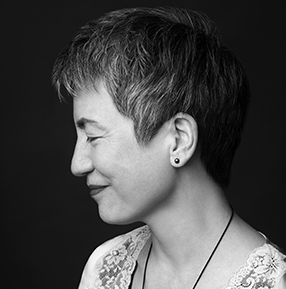Not Nothing
A map on tissue. A mass of wire. Electricity of the highest order.
Somewhere in this live tangle, scientists discovered—
like shipmates on the suddenly-round earth—
a new catalog of synaptic proteins
presenting how memory is laid down:
At the side of the transmitting neuron
an electrical signal arrives and releases chemical packets.
What I had imagined as “nothing” are a bunch of conversing
squirts
remaking flat into intimate.
Copyright © 2015 by Kimiko Hahn. Originally published in Poem-a-Day on August 24, 2015, by the Academy of American Poets.
“At bedtime when my mother read Rudyard Kipling’s ‘How the Rhinoceros Got His Skin,’ I giggled every time she reached the final sentence: ‘But the Parsee came down from his palm-tree, wearing his hat, from which the rays of the sun were reflected in more-than-oriental splendour, packed up his cooking-stove, and went away in the direction of Orotavo, Amygdala, the Upland Meadows of Anantarivo, and the Marshes of Sonaput.’ The place names tickled. I loved them. And years later, I realized that this love, this adoration of sound, was instrumental in my love for what words could do even if one didn’t know what the words actually meant and especially if the words could offer many meanings—like the word ‘tissue’ in ‘Not Nothing,’ a poem triggered by the Nicholas Wade article ‘Brainpower May Lie in Complexity of Synapses.’ Later, Japanese and my studies of Japanese would form this adoration into a sensibility and then an aesthetic (which I’ve written about in my book Brain Fever). So my earliest exposure to words, whether English, Italian (a whole other story) or Japanese, really did affect my sense of delight and magic. From another line in the story, “[The cake] was indeed a Superior Comestible (that’s magic),” in my five-year-old mind, I thought Kipling meant that the word ‘comestible’ was magic. Many of my poems, begin with a word or specific diction. And for me, the language of science has an abiding exotic feel much the same way that the subcontinent of India might be for an Englishman in the 19th century. This is where ‘the Parsee’ has led me—to the brain and the imagination. Oriental? The irony is not lost on me!”
—Kimiko Hahn

